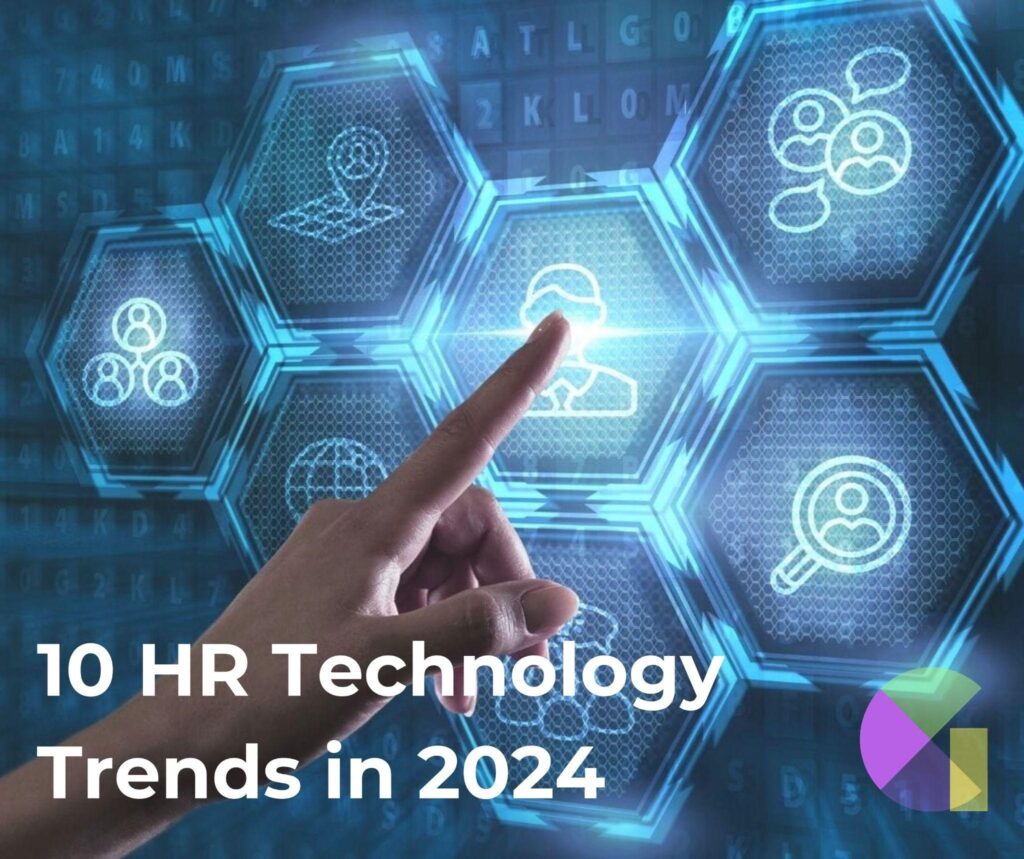
In 2024, the intersection of technology and human resources continues to evolve at a rapid pace, driving significant change in how companies manage their workforces. Particularly in the Middle East, where dynamic growth and a diverse labor market present unique challenges and opportunities, staying ahead of HR technology trends is crucial. In 2023, the Gulf region saw significant investments in HR technology. The HR Tech MENA Summit highlighted that the UAE and Saudi Arabia have been at the forefront of this trend, integrating AI and machine learning for candidate sourcing, screening, testing and hiring, alongside predictive analytics to improve talent acquisition, succession planning and employee retention (HR TECH MENA SUMMIT) (World Economic Forum).
Here are ten key trends that we see shaping HR technology in 2024, with a special focus on the hospitality sector.
1. Enhanced AI-Driven Recruitment
Artificial Intelligence (AI) is transforming recruitment processes by automating repetitive tasks, screening resumes, and identifying the best candidates based on data-driven insights. In the Gulf Region, where HR teams are often swamped with applicants and ambiguous resumes, AI tools can remove bias, streamline workflows, and accelerate recruitment. For example, Gateway Jobs uses AI to match the compatibility of resumes to job vacancies and tests candidates’ interpersonal and communication skills as part of the application process, giving employers a clear and comprehensive picture of each candidate and their potential fit within the company.
2. Elevating Hybrid Workplaces
The hybrid work model, which combines remote and on-site work, is rapidly becoming the new norm. According to Forrester’s prediction report, 60% of organizations are expected to adopt hybrid work models in 2024, while only 10% will continue with a completely remote working model. However, this shift brings challenges in redesigning the workplace, redefining job roles, and fostering an engaging work environment. At Gateway Jobs, we maintain high levels of productivity in our agile and hybrid setup by:
- Deploying centralized platforms like app.gateway-jobs.com that integrate various employee and employer applications, enhancing productivity and streamlining operations.
- Enhancing internal communication through applications such as Slack, Zoom, Google Workspace, and Microsoft Teams.
- Utilizing health and safety tools like OfficeTogether to monitor visitor check-ins, conduct employee health screenings, and provide superior assistance.
3. Digital Learning Platforms
Employee learning and development is a core strategy for every organization. In 2024, L&D professionals will have the uphill task of providing continuous learning along with engagement and inclusivity through hybrid and remote workplaces. E-learning platforms are crucial for flexible learning, ensuring employees stay competitive in a rapidly changing job market. 2024 will be a landmark year with the deployment of gamification and virtual reality in the learning process.
Capitalizing on this, Gateway Jobs has incorporated a series of e-learning modules into our workplace management offerings for UAE clients and professionals looking to advance their careers. These platforms offer personalized learning experiences that can be accessed anytime, anywhere, enhancing service quality and staff expertise, directly impacting customer satisfaction.
4. Automation in HR
Process Automation (PA) is transforming HR by automating repetitive tasks, significantly enhancing recruitment efficiency and accuracy. Automated resume scanning, extracting key information like skills and experience, and ensuring only the best candidates are shortlisted are key benefits. Automation is also evolving the way employers communicate with employees and candidates, sending automated responses, scheduling interviews, and handling rescheduling requests. In data management, automation maintains a centralized candidate database, ensuring data is consistently updated and easily accessible while also ensuring compliance and generating audit-ready reports.
5. Advanced Employee Analytics
The use of advanced analytics tools helps HR professionals make better-informed decisions. By analyzing data on employee performance, engagement, and turnover, businesses can develop strategies to enhance workforce productivity and retention. The contribution of people analytics in critical decision-making and business outcomes will continue to grow through massive adoption and upscaling in 2024. At Gateway Jobs, we believe that for service roles, interpersonal skills, working style, and behaviors are as important as technical skills. Therefore, it is essential to understand the connection between personalities, team dynamics, and performance. We include a Workplace Profile, based on a DISC test, within our application process, providing robust data and insights into how a candidate will fit into the team dynamic and company culture.
6. Robust Diversity and Inclusion Strategy
In the last decade, organizations have increased their efforts to create diverse and inclusive environments for employees. Historically, these efforts were based on subjective ideas of inclusivity, often resulting in misplaced initiatives. With organizations adopting several policies and practices for enhancing diversity and inclusion, it is important to use data analytics to gain actionable insights. As a large proportion of employees prefer to work in a hybrid setup, organizations must place pragmatic measures to enhance diversity and inclusion. This involves driving various processes such as sourcing, hiring, onboarding, employee engagement, grievance redressal, and policy formation through a competent tech-enabled system. Technology that supports employee well-being, such as mental health apps and wellness programs, is gaining traction.
7. Employee Self-Service
Employee self-service is an aspect of HR technology that enables employees to access and manage their HR-related information and tasks independently. This can include updating personal information, viewing payslips, and requesting time off. In 2024, it is expected that employee self-service portals, mobile applications, and chatbots will become increasingly popular. These tools allow employees to access the information they need quickly and easily, regardless of location. The adoption of employee self-service not only improves organizational efficiency and reduces costs but also enhances the employee experience. By providing employees with the ability to manage their HR-related tasks independently, organizations can become more agile and responsive to employee needs, improving employee satisfaction and engagement.
8. Metaverse in HR
The Metaverse is set to revolutionize HR practices. This innovative technology seamlessly integrates virtual meetings, interviews, discussions, onboarding, employee engagement, and learning and development. By creating lifelike virtual environments, the Metaverse allows HR professionals to host dynamic meetings, conduct immersive job interviews, and facilitate engaging discussions among remote teams. Researchers predict rapid adoption of the Metaverse in HR, with an estimated 25% of people spending at least an hour of their daily work routine in this transformative environment by 2026. As organizations increasingly recognize the Metaverse’s potential, its impact on reshaping traditional HR processes and enhancing collaboration across distributed teams will be profound. The Metaverse transcends geographical boundaries, enabling seamless virtual interactions that enrich employee experiences and boost organizational productivity.
9. Hyper-Personalization
Hyper-personalization in the workplace is about tailoring the work environment to maximize employee performance and satisfaction. Consider these questions to understand its impact:
- What work environment brings out the best in employees?
- Is each employee working in a role that utilizes their strengths?
- Which activities, policies, and infrastructure are most meaningful to employees?
- What does an ideal workplace look like?
With more employees than ever working remotely either full-time or part-time and a notable shortage of skilled labor, the decision-making power has shifted from employers to employees. This trend allows employees greater flexibility and the ability to adjust their work environments to better suit their needs. Organizations are now focused on enhancing the employee experience by transforming traditional office spaces into interactive, accommodating, and inclusive environments. They are concentrating on three key pillars to deliver a personalized experience: communication, management, and the work environment.
10. Focus on Employee Well-being
Technology that supports employee well-being, such as mental health apps and wellness programs, is gaining traction. These tools can help maintain a healthy and productive workforce. Prioritizing employee well-being through mental health apps and wellness programs ensures a healthy and productive workforce.
In 2024, HR technology is transforming workforce management through AI-driven recruitment, advanced analytics, and process automation, enhancing efficiency and reducing bias. Embracing hybrid workplaces, digital learning platforms, and robust diversity strategies are crucial for maintaining productivity and inclusivity. Employee self-service portals, the Metaverse, and hyper-personalization cater to evolving employee needs, improving satisfaction and engagement. Prioritizing employee well-being through mental health apps and wellness programs ensures a healthy and productive workforce. By staying ahead of these trends, organizations in the Middle East and beyond can drive growth and adapt to changing business landscapes.
About the Author

Iain Buscombe is the Managing Director and COO of Gateway Jobs, a rapidly expanding technology startup specializing in SaaS recruitment and workforce management solutions tailored for the UAE service sector. With over 15 years of experience in commercial and strategic roles across the Middle East, Africa, and UK markets, he has successfully driven value creation for dynamic consumer brands and services, working with industry leaders in FMCG. Passionate about digitalization, Iain leverages AI and automation to enhance workflow efficiency and offer reliable staffing solutions.
Follow Gateway Jobs COO Iain Buscombe on LinkedIn.
Follow Gateway Jobs CEO Poya Farighi on Linkedin.
Find Gateway Jobs on LinkedIn and Instagram or visit their website https://www.gateway-jobs.com/
Sign up to Gateway Jobs – http://www.gateway-jobs.com/register
READ MORE-
Transforming Trading: Sahar Haidar on How amana is Becoming the Platform of Choice for MENA Traders and Investors
Insights from Von Poll Greece with Ms Natalie Leontaraki: Traditional Values, Expertise, and Client-Centric Service in Real Estate






